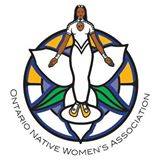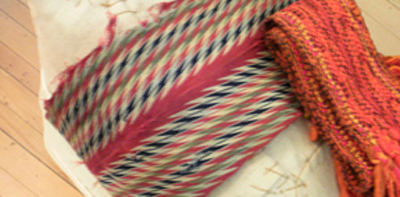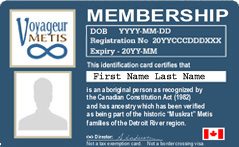


|

|





|
|
||||
|
|












Follow us on 

|
|
Voyageur Metisapplication Cards Metis Card Aboriginal Status rights benefits organizations omfrc"The Metis have as paternal ancestors, the former employees of the Hudson's Bay and Northwest Companies, and as maternal ancestors, Indian women belonging to various tribes. The French word Metis is derived from the Latin participle mixtus which means "mixed"; it expresses well the idea it represents." -- Louis Riel 
Looking for information? - For evidence of our communities and Metis information in general, or issues today concerning the definition of Metis, please click here . For information on Myths about Native ancestry, please click here . Getting your Metis card? - Many people end up calling us out of frustration, so we have put together a list of questions and answers that every person applying should know - please click here . Need help finding your Native Ancestors? For information on how we can help you find documents to prove your ancestry - please click here . We are a registry of communities made up of descendants from the marriages or "unions" of French with Native American people that were part of the fur trade in what was at the time considered "The Northwest". It is well documented that the Metis Nation homeland includes much of what are now communities that originated as fur trade posts across the Great Lakes and its tributaries. The First Metis collective resistance in Red River occurred as a result of a ban on trading pemmican by the Metis to the voyageurs outside of Selkirk Settlement. This led to the Pemmican Wars (1814-1816), a resistance to settlement and the food trade ban, led by the first Great Metis leader, Cuthbert Grant Jr., who declared that the Metis had a collective identity, rights to Rupert's Land, rights to remain free-ranging, and rights to the food supply. The Pemmican Wars ended with the Battle at Seven Oaks, when troops who had captured the Metis fort were then forced to relinquish it back to Grant and the Metis. It is also at this time that the First Metis Treaty Agreement was created (1815). You can view this document by clicking here . The Second Metis collective in Red River was the Northwest Resistance , led by the 2nd Great Metis leader, Louis Riel , in which he led a provisional government for the interest of the Metis, to preserve Metis land, resources, and way of life, a rebellion which ended at the Battle of Batoche (1885) , resulting in Louis Riel being unfairly hanged. Our organization also recognizes the contributions of other Metis leaders, such as Gabriel Dumont and Charles Langlade , among others. We do not define ourselves solely on what happened at Batoche. It is well documented that the kinship of these leaders were often intermingled. What Louis Riel did for the Metis in the 1880s was a continuation of what his predecessor and extended kin Cuthbert Grant Jr. did in the 1810s. There are many kinships between families who would now be considered fur trade "brass". Our organization does not forget our collective history with regard to these kinship ties. There is much proof that records in Ontario and Quebec do not reflect the reality of the 2/3 of Metis who left the west, yet belong to these families, including the families of Cuthbert Grant Jr and Louis Riel. Furthermore, thousands of fur trade contracts for French Canadian men who wintered over or travelled extensively throughout the west, and left behind oral histories, other evidence or visibly Native descendants is part of our collective history. Thousands of families were part of the formation of Metis identity. One does not lose this culture simply by moving to another part of the waterway. You can read more information about required documents and examples by clicking here . The fur trade took place across a great part of Canada and the USA. Along the water routes arose communities of families whose history, traditions and cultural practices we share in common. From Detroit to Sault Ste. Marie, Michilimackinac and further west, in the many small towns scattered across the largest freshwater routes in the world, the culture and traditions of our ancestors were passed down to us -- practices our ancestors were made to feel ashamed about that we choose to be proud to admit and preserve. No, we are not taking on an identity of our ancestors, we are finally admitting to something we have always culturally been. We are coming out of hiding -- an awakening that was predicted by Louis Riel when he wrote "My people will sleep for one hundred years, but when they awake, it will be the artists who give them their spirit back." Although we have chosen the name "Voyageur" from our fur-trading ancestors, we have been well documented and known as "Muskrats" because of our perpetual practice of trapping. Our members generally have the same culture -- in our dances, music, language, stories, cultural practices, knowledge and our unique food (which is not found anywhere else in the world). 

The Canadian government has declared 2010-2020 to be the "Decade of the Metis". Now is the time to celebrate our culture and heritage! Metis metis status card "metis status card" metis status cards list organizations to issue metis status cards government listing Communities of the Voyageur Metis genealogy geneology records research proof documented lines documentation ontario quebec government french canadian contracts heritage culture music fiddle North America Canada history family names old script translation wife wives nation benefits identification authorized fingerweaving finger-weaving finger weaving hunting fishing rights harvesting plants medicine food help ancestors ancestry history family families community communities Voyageur fur trader trade engagee bois brule chicot mixed breed halfbreed half breed other breed french breed routes waterways great lakes rivers watershed food dance music jigging genealogist geneologist canadian american usa us united states Hudsons Hudson's Hudson Bay company co co. northwest HBC NWC tax card taxes canada approved authorized authorization issue issuing registration list culture heritage extensive kinship ties extended cultural communities community culture-driven participation activities music fiddle jigging research study linguistics history Michif language song songs Cree Ojibwe Saulteaux Menominee Huron Wendat Abenaki Montagnais Attikamekw Attikamek Anishnaabe Lakota Sioux Iroquois Mohawk Micmac Mikmak Mikmac Mikmaw, Mi'kmaq Cri Ottawa Ogi-cree Ogicree powwow powwows pow-wow pow-wows |
 FREE Mozilla Firefox download! |